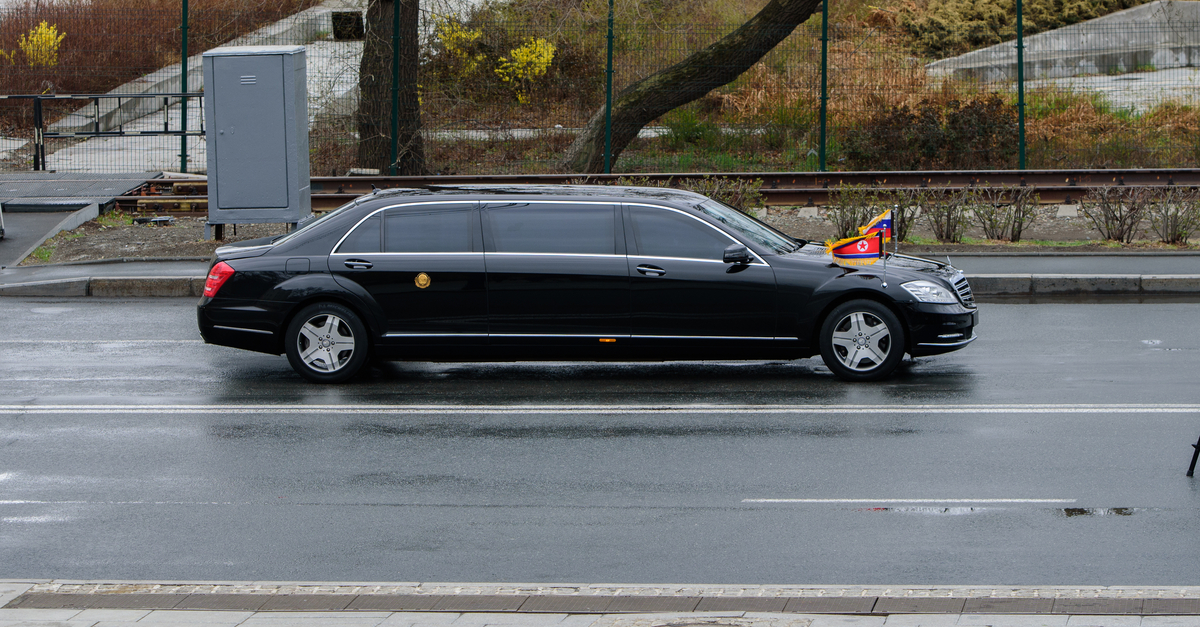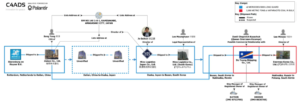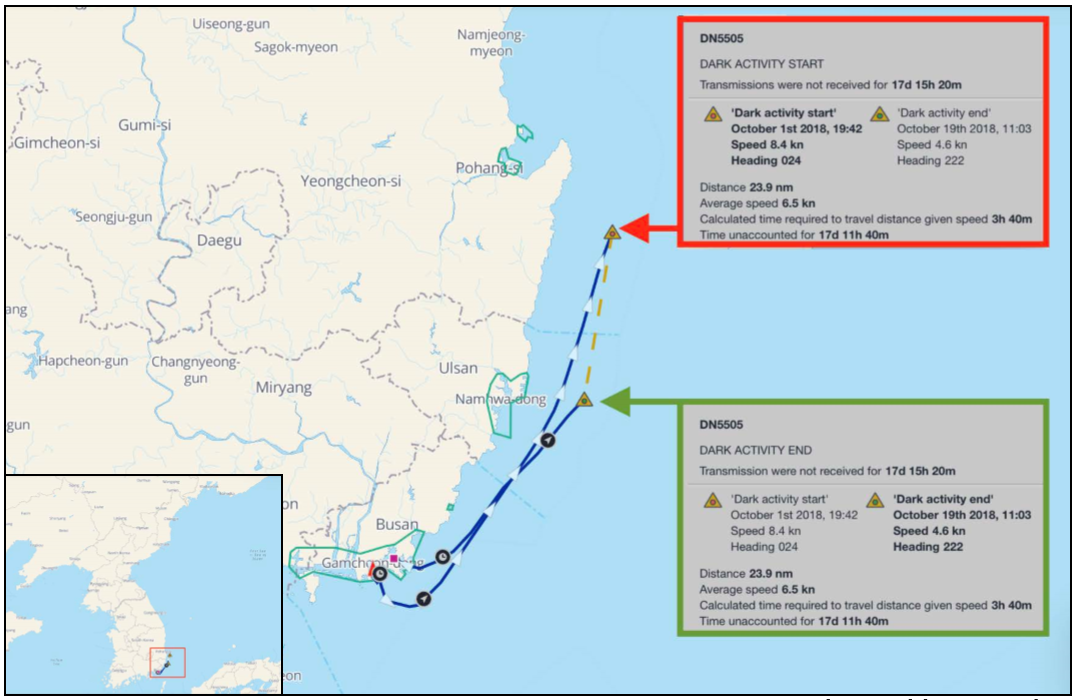The images of Chinese President Xi Jinping and Kim Jong-un waving from atop a Mercedes Benz limo have made the rounds on the internet over the past few days in the wake of a new study published by the Center for Advanced Defense Studies (C4ADS) and covered by the New York Times and CNN, among others. C4ADS research details how North Korea has evaded sanctions to secure luxury goods — and other more nefarious items — through its illicit finance operations. Unsurprisingly, the usual suspects all make an appearance in C4ADS’s painstaking retelling of how two Mercedes-Maybach S600 Guard vehicles — Mercedes are apparently a preferred car of Kim Jong-un’s — made their way from Rotterdam Port in Holland to Pyongyang. There are pit stops in Russia and China, of course, but — at the most crucial point in the whole exercise — the most common friend of corrupt regimes makes an appearance: an anonymous company. The same avenues used in this case to ship high-end vehicles are used the world over by criminals to hide shipments of drugs, weapons, and even humans.
Using “records from corporate, tax, property, maritime, customs, and trade databases to map corporate holdings and business activities,” C4ADS attempted to account for the movement of two freight containers, each containing a Mercedes-Maybach S600 Guard vehicle across the globe. Throughout this exercise, the containers were transferred between numerous ships and, crucially, companies tangentially linked to sanctioned entities and individuals in China and Russia. At least one of these companies is owned by an individual for whom C4ADS could find minimal documentation beyond their name and ownership of said company, including nationality. However, for all these maneuvers, C4ADS notes that they hit the true brick wall in their tracking of who was behind this scheme when the shipping containers in question were transferred onto a ship owned by Do Young Shipping in Busan, South Korea.
Image: Lucas Kuo & Jason Arterburn / C4ADS
C4ADS speculates that Do Young Shipping is likely owned by a Japanese man previously investigated for ties to illicitly providing goods to North Korea, but concludes “Due to the lack of transparency in company records from the Marshall Islands, a secrecy jurisdiction, C4ADS is unable to definitively determine the nature of the relationship.”
This is where it gets complicated — as is so often the case with anonymous companies. Shortly after taking on the containers allegedly containing the Mercedes vehicles, the Do Young Shipping vessel left for sea, and its AIS signal promptly disappeared for 17 days on a trip allegedly destined for Nakhodka, Russia. When it returned from this dark trip, the vessel now had a payload of coal and no longer had the shipping containers on board, as was expected to be the outcome of this trip. However, neither the harbormaster at Nakhodka — nor any harbormaster at any of the other five Russian Far East ports — has any record of the Do Young Shipping vessel’s alleged visit. During this time, C4ADS notes that three heavy lift cargo planes from the North Korean state airline visited Vladivostok, Russia, where again there was no record of the Do Young Shipping vessel docking. C4ADS surmises that it is possible the planes were in the region to carry back the Mercedes vehicles based on their cargo capacities and past use as transport for Kim Jun-un’s limos. Based on the circumstances, it seems likely the limos were transshipped — exchanged between shipping vessels while in transit — to another vessel en route to Vladivostok in exchange for a shipment of coal from North Korea during the time the Do Young Shipping vessel went dark. C4ADS research further supports this conjecture based on the consigner on the coal payload the Do Young Shipping returned to South Korea with, Enermax Korea. Enermax Korea previously made an appearance in a United Nations investigation into a separate North Korean coal transshipment incident with a Russian shipping vessel.
Image: Lucas Kuo & Jason Arterburn / C4ADS
While the lengths to which the North Korean government will go to secure limos for its elites seems extreme in a certain light, C4ADS stresses that it is not only luxury goods that are secured by taking advantage of these cracks in the international economy. In a similar, but far less specious, example, a South Korean man living in Japan received an order from Korea Paekho 7 Trading Company, a company — according to C4ADS — that is widely considered to be a shell for the North Korean government, for two used tanker trucks. These trucks could be converted into missile transport vehicles to be used by the North Korean military apparatus. The pathways exploited to secure North Korean elites’ luxury goods are the same avenues through which far more dangerous materials, especially dual-use materials for their missile program, can be acquired. So long as anonymous companies continue to feast on the secrecy available at the margins of the international economy, rogue nations like North Korea will be able to find ways to exploit that anonymity. That’s why a group of nearly 100 national security experts from across the ideological spectrum wrote to Congress last month calling on lawmakers to end the incorporation of anonymous companies.
“Private entrepreneurs, government officials, and their overseas commercial associates trafficking in the highest-end luxury goods are most likely to be aligned with the procurement priorities of the Kim family and its inner circle.”
– ‘Lux and Loaded,’ C4ADS
However, there is reason to hope that the anonymous company may soon be an endangered species. In the wake of the infamous Panama Papers episode, there is a growing international push for requiring that information on the real person who ultimately controls a company be disclosed at the time of incorporation. In 2016 the United Kingdom, long a breeding ground for financial secrecy, became one of the first nations to institute a beneficial ownership directory. Even more recently, the UK’s overseas territories and crown dependencies announced that they would create their own beneficial ownership directories. These include such well-known secrecy jurisdictions as the British Virgin Islands, the Isle of Man, and Guernsey. In the United States, which a 2014 academic study found to be the easiest place in the world for suspicious individuals to incorporate a company anonymously, there is growing bipartisan movement in both the House of Representatives and the Senate to collect beneficial ownership information to assist law enforcement and national security officials. The bipartisan Corporate Transparency Act of 2019 (H.R.2513), which advanced out of the House Financial Services Committee in June with a strong 43-16 vote, would require U.S. companies to disclose their beneficial owner(s) to the Financial Crimes Enforcement Network when they incorporate and keep their ownership information up to-do-date. Bipartisan bills in the Senate include a sister bill to the Corporate Transparency Act (S.1978) as well as the TITLE Act (S.1889) and the draft ILLICIT CASH Act.
Combined with the progress abroad, these bills present a unique opportunity to finally close down the number one tool used by rogue regimes to evade our sanctions and undermine our national security. If we fail to act, the North Korean government, and other rogue elements like it, will continue to be able to enter and exit the international market — for luxury goods, military equipment, and raw materials for their missile program — through their favorite tool: the anonymous company.
The full C4ADS report can be read here.
###
Tyler Morrow is an Advocacy Intern with the FACT Coalition.



